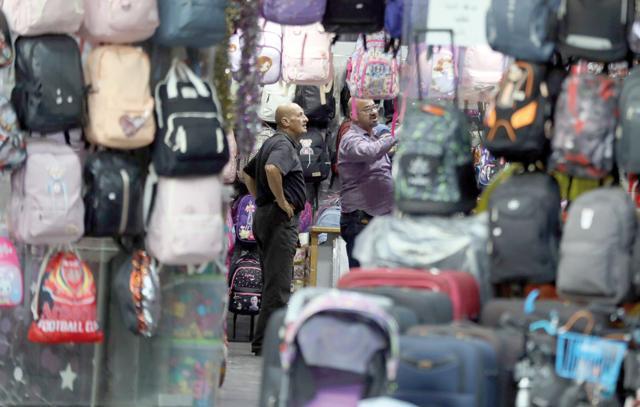You are here
Jordanians criticise gov’t’s economic policies
By Khetam Malkawi - Dec 06,2015 - Last updated at Dec 06,2015
AMMAN — Since Prime Minister Abdullah Ensour’s first government took office in October 2012, the Cabinet’s economic decisions have negatively affected Jordanians’ quality of life, citizens interviewed by The Jordan Times charged on Sunday.
Although the government revisited its recent decision to increase the price of gas cylinders and car licence fees on Sunday, they expressed anger over a broader range of policies that “neglected to take into consideration the average salary in Jordan and the living standards of Jordanians”.
They also criticised the government for “always resorting to people’s pockets as the solution for its economic woes, rather than looking for other alternatives without a direct impact on Jordanians.
Ibrahim Khreisat, a father of five, said he can barely earn a living from his work in farming.
The resident of Tafileh, 180km southwest of Amman, said his income, although stable, is insufficient and so he is in debt, while the government is making it “more difficult for me and others living in my town”.
Khreisat added that even if the government is revisiting its recent decisions, “the problem is cumulative… we are exhausted already and there should be a solution that does not affect our lives.”
“This government should resign, unless it is going to consider citizens a priority,” said Saleh Faraheed, a retired serviceman who also resides in Tafileh.
Over the past three years, “our quality of life has been deteriorating… with the unexpected hikes in prices from time to time; my pension does not cover my family’s needs”, he said.
Faraheed, a father of six, noted that not only is the public debt rising with time, but “my debts are also increasing as a result of the hikes in prices of commodities and even basic necessities,” adding that university fees for two of his sons have compounded his financial burden.
The pensioner also argued that his governorate is “almost forgotten by the government, which is not implementing development projects to provide job opportunities for the unemployed youth there”.
With a population of 91,000, Tafileh Governorate has long suffered from poverty and unemployment. In 2013, it had the highest rate of unemployment — 17.1 per cent — in Jordan.
The situation in Mafraq, 80km northeast of Amman, is no better, according to some of its residents, who said they shoulder a double burden — rising prices and the Syrian refugee influx.
Although both she and her husband are public sector employees in Mafraq, Khetam Mohammad said the unprecedentedly high cost of living over the past three or four years “affected my family’s quality of life”.
“When buying groceries, vegetables and fruits, I started to look for the least expensive,” the mother of three added.
Mohammad explained that she had to reduce her family’s expenses to survive on the modest family income.
“However, sometimes we cannot control the demands of our children and end up with a financial burden,” she said.
Mohammad added that she did not have confidence in the quality of public education due to the overcrowded classrooms in the city, which hosts more than 100,000 Syrian refugees.
“I had to transfer the children to private schools to secure them a better education… but this is too much for us.”
For Ahmad Shdeifat, a 35-year-old public sector employee in Mafraq, not a month passes by without the need to borrow money to pay prices that, he said, do not take salaries into consideration.
The father of two decided to send his older child to a private school due to the overcrowded classrooms. “When Ensour was first sworn in as prime minister, I was very optimistic… but then when he and his government started imposing new taxes whenever there was an economic problem, I changed my mind,” he said. Mohammad Awadh, a retired serviceman from Irbid, 80km north of Amman, also blamed the incumbent government for his financial burdens.
Awadh said more than two-thirds of his JD700 pension goes to pay back bank loans.
“Three of my children go to university and this requires a lot of money,” the father of six added.
He called on the government to match prices of fuel with international prices in order to alleviate the burden on Jordanians.
Karak resident Baha Ammarin said that while the government generally maintains an awareness of the impact of its policies on people’s lives, some of its decisions are not thoroughly studied.
He suggested that instead of increasing car licence fees, the government should impose extra fees on vehicles such as motorcycles that people use for “leisure or to show off”.
However, Amman resident Amneh Helweh feels that the government’s economic policies affect “citizens’ feeling of security and dignity” regardless of their income.
“Jordanians are shouldering the impact of these decisions in all aspects of their lives,” noted Helweh, who is a human rights activist.
Related Articles
AMMAN — A man in his 20s was found dead, reportedly hung to death, on Sunday in his family’s house in Tafileh, 180km southwest of Amman, the
AMMAN — The beginning of the second semester coincides with nationwide weather depression, exacerbating parents’ financial concerns. &n
AMMAN — The government is aware of the magnitude of challenges and pressures on the Kingdom and seeks to serve Jordan and its citizens to me

















